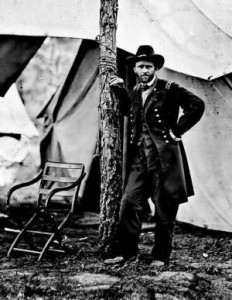Today U. S. Gen. Ulysses S. Grant, days after being named commander of the United States Army, meets with Gen. William Tecumseh Sherman, commander of the Union’s western forces. Grant’s grand plan is to consolidate Union forces into two large armies in the theaters of Virginia and Georgia. From his base in Chattanooga, Sherman is given the task of capturing Atlanta, with the assurances that two of his best divisions currently serving in the Red River campaign will return to Chattanooga in time for the beginning of the Atlanta offensive.
Meanwhile, in the Confederacy a soldier writes a letter to his family. Alexander Balus West is a Baptist layman, active in his church and local association. Enrolling in the 54th North Carolina as a private in April 1862, he fought in the Battle of Gettysburg and afterwards spent several months as a prisoner of war. Now, he is a corporal.
Today West writes a letter to his five-year-old son. Fearing that he would not see his young son again, he tells the boy’s mother to “keep this for you til you can read it.” Perhaps this is the last letter West writes to his son, as he is killed in September in the Third Battle of Winchester, also known as the Battle of Opequon, one of hundreds of thousands of fathers and sons whose lives are taken from their families due to the war.
West’s death is a result of Grant’s grand plan, a strategy that includes tasking Gen. Philip Sheridan with exclusively pursuing Conf. Lt. Gen. Jubal Early in the Shenandoah Valley. Sheridan’s orders to pursue Early come in August, and in September the young, talented Sheridan defeats Early in the Third Battle of Winchester on September 19. More clashes follow, and by November Early’s forces are largely decimated. Control of the Shenandoah Valley from henceforth is under Union control.
Sources: “Opequon or Third Winchester,” National Park Service (link); “The Civil War, 1864-1865,” U.S. Army Center of Military History (link); Charlotte West Dade, “The West Patriarchs: 4th in a Series, Alexander Balus West” (link); “Philip Sheridan,” Civil War Trust (link)



